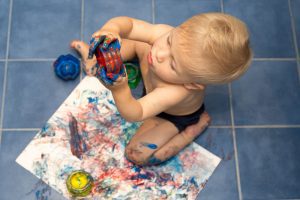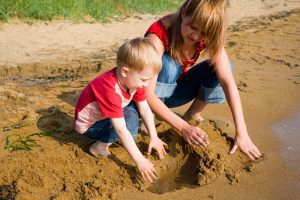The importance of messy play – and how to do it well

By Kat Wieczorek-Ghisso
Co-founder of Paisley Park Early Learning Centres
Most people love a pristine squeaky-clean household. But when young children are around, this proves somewhat of a challenge.
No wonder we breathe a sigh of relief when they retreat to blissful slumber in the evening. We get some time to ourselves. We also get time to clean up all the mess.
Whilst many of us feel frustrated about what seems like Groundhog Day every day, there is value to what our children are doing when they get messy.
At birth, the child’s brain produces more than a million neural connections each second. For the first three years, the brains’ task is to connect important messages via corridors known as synapses. Critical periods of learning occur when these synapses are rapidly developing. As the child explores their environment, synapses become more complex and synapses used frequently become permanent knowledge connectors.
Children explore their environment using their senses; sight, smell, touch, taste, hearing. That’s why messy play is often referred to as sensory play. When children use their senses, they stimulate other forms of learning. These skills include:
Communication: Messy play often takes place with others where interaction is rich and plentiful.
Inquisitiveness: Messy play is unpredictable and leads to various avenues of exploration.
Social competence: The negotiation of play scenes requires collaboration and skilful sharing of resources.

Concentration: Children need high levels of focus when exploring a sensory-rich environment.
Cognitive processing: When children engage in sensory play, they are thinking through their discoveries and repeating actions.
Planning and strategising: During messy play children use their mind to plan, problem solve and process information.
Independence and goals setting: When children explore, they often set themselves goals and they become determined to reach an outcome.
Emotional maturity: Sensory play is open-ended and error-free, therefore builds confidence and self-esteem.
Physical skills: Sensory play requires active movement using both small (fine motor) and large (gross motor) muscle movement. The use of open-ended tactile resources strengthens muscle control and hand-eye coordination.
Body awareness: Physical movement supports children’s understanding of spatial awareness and personal space.

Given the abovementioned benefits, we need to be more open to the idea of children being messy and support this very important learning through everyday experiences.
So how do you do it?
Look around for some common household items. Research how you can use them. Below are a few ideas to get you started.
- Make goop using corn flour and water
- Make playdough using plain flour, salt and oil
- Scrunch up garden leaves
- Collect garden stones and twigs in various sized containers
- Invest in a shredder and pour paper in and out of used cardboard boxes
- Allocate a small section of your yard for digging and mud play
- Reuse drink bottles to make a water display with coloured dye, glitter, pebbles and oil

There are endless opportunities to foster your child’s learning and what better way than getting involved in sensory play yourself.
Mess is inevitable. You can clean it up together.
Our children now spend are far too much time sucked into the technology vortex, using all sorts of techy gadgets rather than exploring the natural wonder of our environment. If we don’t intervene now, in time we will simply lose our creative spirit or ability to think outside the box.
Delivering The Best in Early Learning
Every child deserves the best start in life. Get in touch today!
